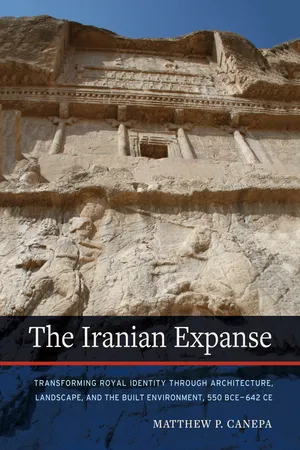
eBook - PDF
The Iranian Expanse
Transforming Royal Identity through Architecture, Landscape, and the Built Environment, 550 BCE–642 CE
- 512 pages
- English
- PDF
- Available on iOS & Android
eBook - PDF
The Iranian Expanse
Transforming Royal Identity through Architecture, Landscape, and the Built Environment, 550 BCE–642 CE
About this book
The Iranian Expanse explores how kings in Persia and the ancient Iranian world utilized the built and natural environment to form and contest Iranian cultural memory, royal identity, and sacred cosmologies. Investigating over a thousand years of history, from the Achaemenid period to the arrival of Islam, The Iranian Expanse argues that Iranian identities were built and shaped not by royal discourse alone, but by strategic changes to Western Asia’s cities, sanctuaries, palaces, and landscapes. The Iranian Expanse critically examines the construction of a new Iranian royal identity and empire, which subsumed and subordinated all previous traditions, including those of Mesopotamia, Egypt, and Anatolia. It then delves into the startling innovations that emerged after Alexander under the Seleucids, Arsacids, Kushans, Sasanians, and the Perso-Macedonian dynasties of Anatolia and the Caucasus, a previously understudied and misunderstood period. Matthew P. Canepa elucidates the many ruptures and renovations that produced a new royal culture that deeply influenced not only early Islam, but also the wider Persianate world of the Il-Khans, Safavids, Timurids, Ottomans, and Mughals.
Frequently asked questions
Yes, you can cancel anytime from the Subscription tab in your account settings on the Perlego website. Your subscription will stay active until the end of your current billing period. Learn how to cancel your subscription.
No, books cannot be downloaded as external files, such as PDFs, for use outside of Perlego. However, you can download books within the Perlego app for offline reading on mobile or tablet. Learn more here.
Perlego offers two plans: Essential and Complete
- Essential is ideal for learners and professionals who enjoy exploring a wide range of subjects. Access the Essential Library with 800,000+ trusted titles and best-sellers across business, personal growth, and the humanities. Includes unlimited reading time and Standard Read Aloud voice.
- Complete: Perfect for advanced learners and researchers needing full, unrestricted access. Unlock 1.4M+ books across hundreds of subjects, including academic and specialized titles. The Complete Plan also includes advanced features like Premium Read Aloud and Research Assistant.
We are an online textbook subscription service, where you can get access to an entire online library for less than the price of a single book per month. With over 1 million books across 1000+ topics, we’ve got you covered! Learn more here.
Look out for the read-aloud symbol on your next book to see if you can listen to it. The read-aloud tool reads text aloud for you, highlighting the text as it is being read. You can pause it, speed it up and slow it down. Learn more here.
Yes! You can use the Perlego app on both iOS or Android devices to read anytime, anywhere — even offline. Perfect for commutes or when you’re on the go.
Please note we cannot support devices running on iOS 13 and Android 7 or earlier. Learn more about using the app.
Please note we cannot support devices running on iOS 13 and Android 7 or earlier. Learn more about using the app.
Yes, you can access The Iranian Expanse by Matthew P. Canepa in PDF and/or ePUB format, as well as other popular books in Art & History of Ancient Art. We have over one million books available in our catalogue for you to explore.
Information
Table of contents
- Cover
- THE IRANIAN EXPANSE
- Title
- Copyright
- Dedication
- CONTENTS
- ACKNOWLEDGMENTS
- PREFACE
- 1 Introduction: Conceptualizing Iran and Building Iranian Empires
- PART ONE Ordering the Earth
- PART TWO Sacred Spaces
- PART THREE Landscapes of Time and Memory
- PART FOUR Palace and Paradise
- Epilogue
- NOTES
- BIBLIOGRAPHY
- INDEX